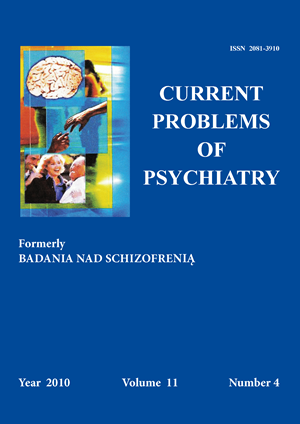Sexual dysfunction in patients with schizophrenia – review of literature
Keywords:
sexual dysfunctionAbstract
Sexual dysfunctions are prevalent among patients with schizophrenia and may be related to both the psychopathology of disease and the pharmacotherapy. The negative symptoms of schizophrenia limit the capability for interpersonal and sexual relationships. Mechanisms for sexual dysfunction among patients with schizophrenia include medication-related effects, such as elevation of plasma prolactin levels, sedation owing to antihistaminergic effects, adrenergic effects and serotonergic blockade. The first-generation antipsychotics cause further deterioration of sexual functioning and consequently may decrease quality of life. Due to their fewer sexual side effects, the second-generation antipsychotics may provide an option for schizophrenia patients with sexual dysfunctions.
Despite this, in scientific studies concerning several aspects of sexual self-perception, results revealed that schizophrenic patients, compared to healthy individuals, had significantly higher scores on the aspects of negative emotionality and sexual incompetence and significantly lower scores on the aspects of sexual satisfaction. Significantly higher scores of negative emotionality result from reduced interest in this sphere of life and the isolation of patients. No significant differences between acute and chronic schizophrenic patients regarding negative emotionality, perception of sexual incompetence and sexual satisfaction suggests that high negative emotionality, perception of sexual incompetence and low sexual satisfaction are not the results of long-lasting illness or lengthy taking of antipsychotics medication but phenotypic characteristics of schizophrenia.
There is a significant influence of sexual problems on the decrease in quality of life and worse cooperation between patient and physician. Furthermore, most patients do not spontaneously report sexual dysfunction to their clinicians, because of the personal nature of sexual behavior. Thus, it is not possible to exclude such an essential aspect of life, and that is why careful interview and estimation of sexual functioning should be constant and indispensable component of psychiatric examination in both clinical and research settings.
References
1. Kuczyński W., Rzewuska M., Luks M. Wpływ leków przeciwpsychotycznych na funkcje seksualne. Seksuologia Polska, 2003; 1(1): 23-29.
2. Macdonald S., Halliday J., MacEwan T., Sharkey V., Farrington S., Wall S., McCreadie R.G. Nithsdale Schizophrenia Surveys 24: sexual dysfunction. Br. J. Psychiatry, 2003; 182: 50-56.
3. Ndubueze Nnaji R., Friedman T. Sexual dysfunction and schizophrenia: psychiatrists` attitudes and training needs. Schizophr. Bull., 2008; 32: 208-210.
4. Akhtar S., Thompson J.A. Schizophrenia and sexuality: a review and a report of twelve unusual cases – part II. J. Clin. Psychiatry, 1980; 41: 166-174.
5. Kelly L.D., Conley R.R. Sexuality and schizophrenia: a review. Schizophr. Bull., 2004; 30: 767-779.
6. Kasperek-Zimowska B., Brodniak W.A., Sarol-Kulka A. Zaburzenia seksualne w schizofrenii - przegląd badań. Psychiatr. Pol., 2008; XLII(1): 97-105.
7. Peiti M., Rubensa G., Peiti V., Ljubicic D., Pavlovic E. Aspects of sexual self-perception in schizophrenic patients. Eur. J. Psychiat., 2009; 23(1) :37-46.
8. Gitlin M.J. Psychotropic medications and their effects on sexual function: diagnosis, biology and treatment approaches. J. Clin. Psychiatry, 1994; 55: 406-413.
9. Leysen J.E., Jansenn P.M.F., Heylen L. Receptor interactions of new antipsychotics: relation to pharmacodynamic and clinical effects. Int. J. Psychiatry Clin. Prac., 2000; 2: 503-517.
10. Turrone P., Kapur S., Seeman M.V.. Elevation of prolactin levels by atypical antipsychotics. Am. J. Psychiatry, 2002; 159: 133-135.
11. Aizenberg D., Modai I., Landa A., Gil-Ad I., Weizman A. Comparison of sexual dysfunction in male schizophrenic patients maintained on treatment with classical antipsychotics versus clozapine. J. Clin. Psychiatry, 2001; 62(7): 541-544.
12. Hummer M., Kemmler G., Kurz M., Kurzhaler I., Oberbauer H., Fleischhacker W.W. Sexual disturbances during clozapine and haloperidol treatment for schizophrenia. Am. J. Psychiatry, 1999; 4: 631-633.
13. Kleinberg D.L., Davis J.M., de Coster R., Van Baelen B., Brecher M. Prolactin levels and adverse events in patients treated with risperidone. J. Clin. Psychopharmacology 1999; 19: 57-61.
14. Tran P.V., Hamilton S.H., Kuntz A.J. Double-blind comparison of olanzapine versus risperidone in the treatment of schizophrenia and other psychotic disorders. J. Clin. Psychopharmacology, 1997; 17: 407-418.
15. Markianos M., Hatzimanolis J., Lykouras L. Neuroendocrine responsivities of the pituitary dopamine system in male schizophrenic patients during treatment with clozapine, olanzapine, risperidone, sulpiride or haloperidol. Eur. Arch. Psychiatry and Clin. Neuroscience, 2001; 251(3):141-146.
16. Goldstein J.M., Cantillon M. Low incidence of reproductive/ hormonal side effects with Seroquel (quetiapine) is supported by its lack of elevation of plasma prolactin concentrations. 36th Annual Meeting of the American College of Neuropsycho-pharmacology, Honolulu, HI, December 1997.
17. Bobes J., Garc A-Portilla M.P., Rejas J., Hern Ndez G., Garcia-Garcia M., Rico-Villademoros F., Porras A. Frequency of sexual dysfunction and other reproductive side-effects in patients with schizophrenia treated with risperidone, olanzapine, quetiapine, or haloperidol: The results of the EIRE study. J. Sex. Marital Ther., 2003; 29: 125-147.
18. Tamminga C.A., Mack R.J., Granneman G.R. Silber C.J., Kashkin K.B. Sertindole in the treatment of psychosis in schizophrenia: efficacy and safety. Int. Clin. Psychopharmacol., 1997; 12(supl 1): 29-35.
19. Smith S.M., O`Keane V., Murray R. Sexual dysfunction in patients taking conventional antipsychotic medication. Br. J. of Psychiatry, 2002; 181: 49-55.
20. Knegtering H., Blijd C., Boks M.P.M. Sexual dysfunctions and prolactin levels in patients using classical antipsychotics, risperidone or olanzapine, Schiozoph. Res., 1999; 36: 355-356.
21. Konarzewska B., Popławska R., Szulc A., Waszkiewicz N. Wybrane aspekty funkcjonowania seksualnego młodych mężczyzn chorych na schizofrenię. Seksuol. Polska, 2008; 6(1): 1-5.
22. Aizenberg D., Zemishlany Z., Dorfman-Etrog P., Weizman A. Sexual dysfunction in male schizophrenic patients. J. Clin. Psychiatry 1995; 10: 47-61.
23. Ghadirian A.M., Choiunard G., Annable L. Sexual dysfunction and plasma prolactin levels in neuroleptic-treated schizophrenic outpatients. J. Nerv. Ment. Dis. 1982; 170: 463-467.
24. Crenshaw T.L., Goldberg J.P. Sexual pharmacology. Drugs that affect sexual functioning. Norton; London: 1996.
25. Rzewuska M. Leczenie zaburzeń psychicznych. PZWL; 2006.
26. Rzewuska M. Zaburzenia seksualne wywołane przez leki przeciwdepresyjne. Metody postępowania. Via Medica; Gdańsk: 2004.
27. Perkins D.O. Predictors of noncompliance In patients with schizophrenia. J. Clin. Psychiatry 2002; 63: 1121-1128.
28. Lew-Starowicz Z., Krajka K., Darewicz B. Zdrowie seksualne – trudny problem dla lekarzy. Seksuol. Polska 2004; 2(2): 33-38.
29. Deklaracja Praw Seksualnych WHO 2002. Lew-Starowicz Z. Zaburzenia seksualne w praktyce ogólnolekarskiej. Termedia; Poznań: 2004.


